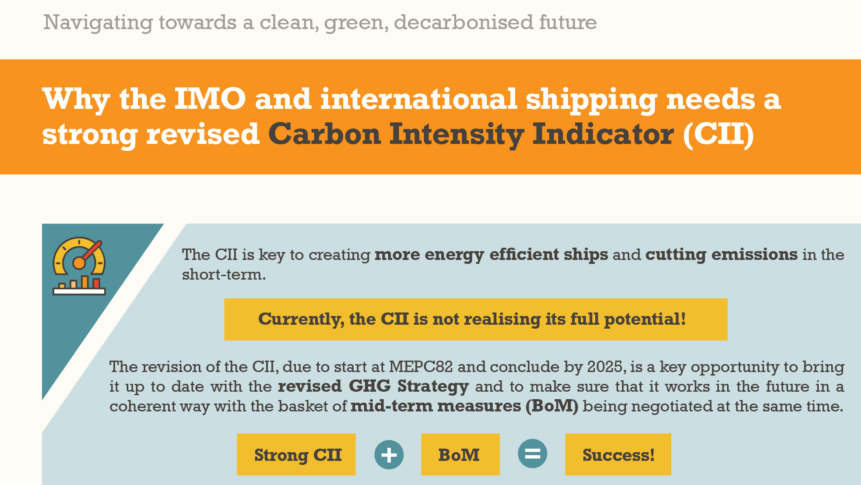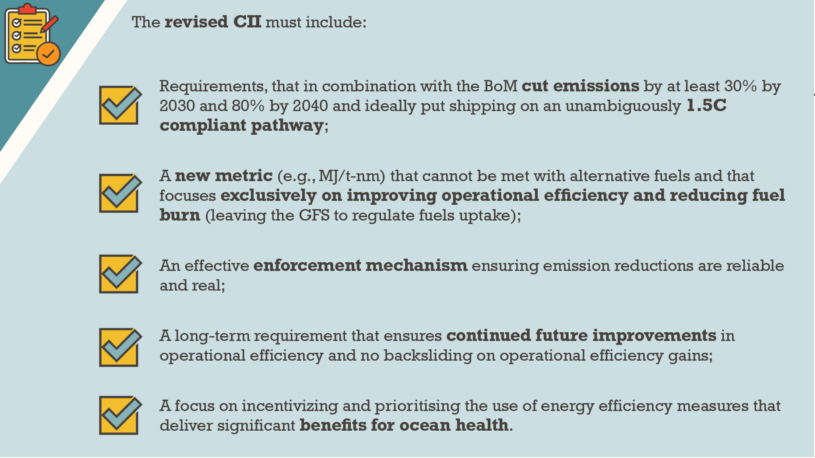MEPC81: Support For Pricing Greenhouse Gas Emissions from Shipping Grows But Important Pieces Of Puzzle Still Missing
London, 22 March, 2024:- As this week’s meeting of the International Maritime Organization’s Marine Environment Protection Committee (MEPC 81, March 18-22) winds down, the Clean Shipping Coalition welcomed the growing support for a greenhouse gas (GHG) emissions levy, but warned that IMO member states must also maintain focus on other key issues such as the global fuel standard (GFS) and the improvement of how energy is used in ships via the carbon intensity indicator (CII).
“MEPC81 reaffirmed to us that countries clearly back a GHG emissions levy rather than weaker alternatives, which sends a strong signal for further developing the policy”, said Clean Shipping Coalition President John Maggs. “However the IMO must not lose sight of the other, equally important measures, namely agreeing on a clean energy standard (GFS) and improving the energy efficiency of ships through the Carbon Intensity Indicator (CII). On the latter in particular, I was delighted to see IMO member states this week firmly reject the shipping industry’s attempt to downgrade the CII rules. This is a good omen not just for the CII’s big moment at MEPC 82 this October, but the whole discussion on measures to deliver the 2023 GHG Strategy emissions reduction goals.”
“The UN is on the edge of adopting the world’s first-ever global emissions price, but the policy will only be as successful as countries make it to be”, said Sandra Chiri, Shipping Manager, Ocean Conservancy. “The March talks at the IMO gave us hope that a clear majority of countries—the Caribbean, the Pacific, Africa, but also the EU and Canada—understand the huge opportunity of pricing shipping emissions for the industry’s clean transition and for making sure this transition benefits all developing countries. It’s regrettable that a small but persistent minority strives to water down this vital climate measure, with a proposal of their own that we know is not ambitious enough. As the IMO negotiations move forward, I hope to see countries engage constructively in designing the future GHG price in a way that protects our oceans, livelihoods and the planet.”
“The IMO agreed last year that some form of emission pricing is necessary to meet shipping’s climate commitments, and during these last two weeks we were pleased to see an overwhelming majority of countries backing a fully-fledged Greenhouse Gas emission price – i.e. a levy, with the Caribbean Island states in particular putting a new wind in the sails of this key climate policy”, said Anaïs Rios, Shipping Policy Officer, Seas At Risk. “The Pacific Islands and Belize proposal for a levy of $150/tonne of GHG emissions is the most mature and ambitious proposal on the table, and we urge governments to work constructively over the summer ensuring it prioritises equity and fosters a just transition for all involved.”
“The IMO negotiations this week achieved a near consensus to move ahead with a global fuel law that will create demand for green fuels”, said Faig Abbasov, Shipping Director, Transport & Environment. “However, the success of the fuel standard rides on proper accounting of emissions across the supply chain. Negotiators must take lifecycle emissions into account so that the likes of grey hydrogen, LNG and biofuels do not simply lead to one bad fuel replacing another. And a green fuels standard alone is not enough. Carbon pricing will ensure that polluters pay, while efficiency standards can ensure that ships start getting cleaner today, not just in 2050.”
ENDS
More CSC MEPC 81 submissions can be viewed and downloaded here
Infographic: Why the IMO and international shipping needs a strong revised Carbon Intensity Indicator (CII)
Contact: Dave Walsh, press@cleanshipping.org, +34 691 826 764
About the Clean Shipping Coalition:
The Clean Shipping Coalition is an international association of civil society environmental protection organisations, and the only one with a purely shipping focus.
We help develop and drive global environment and climate laws on shipping, principally at the United Nation’s shipping regulator, the International Maritime Organization.


